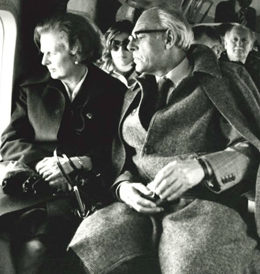Release of MT's private files for 1979 - (3) Domestic policy
The files at Churchill reveal aspects of politics obscured or excluded from the official archive at the National Archives in Kew. They reveal the PM's relationships with the Party, which of course fell largely outside the remit of the machine, as well as dealings with the Press and attempts to give the PM an independent viewpoint on policy via the "Policy Unit". These files give us a better grasp of how domestic policy was handled at No.10.
Domestic policy: no picnic & not much of a honeymoon

The political scene darkened quite rapidly after the General Election: there wasn’t much of a honeymoon for MT. Private polling at the end of the year showed the Conservatives behind Labour from June onwards, where they stayed. The Liberals were also gaining ground. Polling results on issues were also disappointing. By October net approval of Government handling of the make-or-break issue of cost of living was minus 46 per cent.
Driving things down was the economy. The political atmosphere soured as recession deepened (it was beginning at the time of the General Election). By 12 Nov MT's Political Secretary Richard Ryder was writing “I should emphasise that the Prime Minister might now face demonstrations wherever she goes”.
In early November the market for government debt dried up and an emergency package of measures had to be introduced to restart the sale of gilts. This involved a 3 point increase in interest rates, from 14 to 17 per cent – the largest one day increase in British history, before or since. After this Howe’s June budget was widely seen as having done too little to curb the public deficit and to control money supply, criticisms reflected in a note by MT's subtle and powerful parliamentary aide, Ian Gow, who told her of backbench discontent at a meeting on 27 Nov where the desire to cut spending went across the party.
Former Labour deputy leader (then President of the European Commission) Roy Jenkins gave the BBC's annual Dimbleby Lecture on 22 Nov sketching the case for a centre party. This led to discussion at Central Office whether there was any Conservative backbench support for such a thing? (The Chief Whip said not, but that it was even discussed says a lot.)
Labour’s troubles, of course, were greater. Given the depth of Labour in-fighting it is perhaps no surprise to find some leaked party documents in MT’s files - notably a 1975 report to the NEC on ‘entryism’ by Labour’s National Agent Reg Underhill, an early reference to an issue that came to dominate public perceptions of Labour over the next years. There are also some speechwriters’ notes from the General Election, a list of Labour special advisers (Vince Cable among them, working for John Smith), and a presentational draft detailing “Government Achievements”.
The files show that MT was drawing significant support from Labour and ex-Labour figures. Woodrow Wyatt was sending her unsigned memoranda of advice. She had had correspondence and meetings with Lord George-Brown, a former Labour Foreign Secretary and deputy leader, and drew an almost embarrassingly gushing letter from the Labour Speaker, George Thomas after a visit to Chequers (24 Jun): “I cannot tell you how grateful I am to you for your infinite kindnesses to me. You are in my prayers that you will be able to lead our country through its present difficulties to a good sound economy. You deserve to succeed and it is in everyone’s interest that you shall do so”.
MT wrote a two-page personal credo for inclusion in her Oct 79 conference speech (“Thoughts on the Moral Case I”). Her speechwriters doubtless said nice things about it, but didn't use a word. This leads one to wonder how much seniority was needed to get something into the PM's speech: if the PM couldn't do it, who could? Perhaps the speechwriters claimed to be divinely inspired.
The credo includes thoughts not far removed from MT's hugely controversial remark in 1987: “There is no such thing as society”. Scribbling in ballpoint on blank A4 paper she wrote: “Morality is personal. There is no such thing as a collective conscience, collective kindness, collective gentleness, collective freedom. To talk of social justice, social responsibility, a new world order, may be easy and make us feel good, but it does not absolve each of us from personal responsibility”.
There is another longer section by her on “The First Few Months” – again not used in the final speech, but giving her take on the record to date. She came close to expressing the essence of her politics in the phrase: “the attitude of fatalistic dependence is profoundly dangerous and has to be reversed”.
